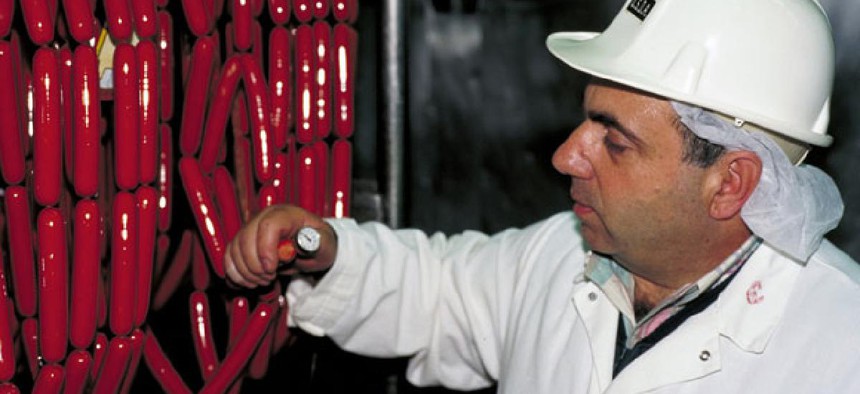
Agriculture Department file photo
Don't Worry, Meat Will be Inspected Under Sequester
USDA avoids some furloughs, but secretary still demands a longer-term solution.
The inclusion of new funds for federal meat inspectors in the just-passed fiscal 2013 spending bill gives the Agriculture Department some relief from the dreaded across-the-board automatic spending cuts that nearly all other agencies must still absorb.
As part of the continuing resolution to extend government funding through the fiscal year while locking in $85 billion in cuts under sequestration, Congress agreed to single out the Food Safety and Inspection Service for supplemental funds after pressure from Sens. Roy Blunt, R-Mo., and Mark Pryor, D-Ark.
Agriculture Secretary Tom Vilsack on Friday said in a statement to Government Executive that "this action in Congress is an acknowledgment that sequestration left USDA with no other option but to furlough meat inspectors. Passage of the continuing resolution provides us with funding to help address those furloughs, but this action does not eliminate the critical need for Congress to find a responsible solution to sequestration through balanced deficit reduction."
The omnibus bill that funds most of the government at 2012 levels includes $1.03 billion for mandatory food inspection programs, and transfers $55 million in existing agriculture funds to the service.
Blunt hailed passage of the amendment, which the House also accepted, saying it protects Americans’ jobs at meat, poultry, and egg production facilities nationwide. “Without the Pryor/Blunt amendment, it’s estimated that the [Agriculture] Department’s projected food inspector furloughs would have closed nearly 6,300 food inspection facilities across America,” he said. “As a result, over 500,000 industry workers would have lost nearly $400 million in wages.”
J. David Cox Sr., national president of the American Federation of Government Employees, called the continuing resolution a mixed blessing, decrying the continuation of the federal pay freeze and spending cuts under sequestration. But, he said, “Congress did provide some agencies, particularly the Defense and Agriculture departments, with funding flexibility that should allow them to revisit previously announced personnel actions, including furloughs and firing of temporary and term employees. Instead of imposing such actions indiscriminately, these personnel decisions should be based on mission requirements, program needs and other priorities.”
Before the food inspection funds were added, Agriculture had been planning to shave $2 billion from its books during the remainder of the fiscal year by managing cuts of about 7 percent. In a speech earlier this month, Vilsack rebutted Republicans’ arguments that meat inspection funds could be replenished without new appropriations from Congress, and without the revenue increases sought by President Obama.
“It's not as if, in the inspection area in particular, we can take money from some other mission area,” he said. “We cannot do that.” He noted that 87 percent of the food safety budget includes employing inspectors, while 5 percent constitutes operating expenses and the remainder goes toward testing and analysis.







